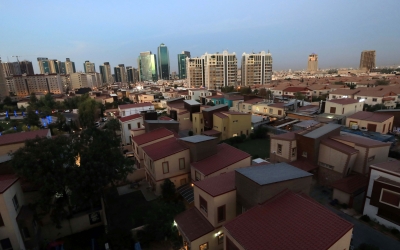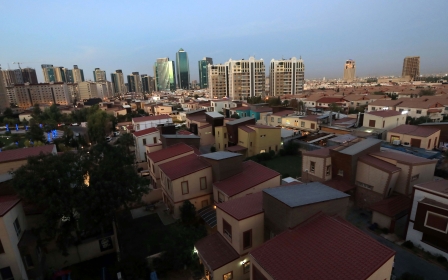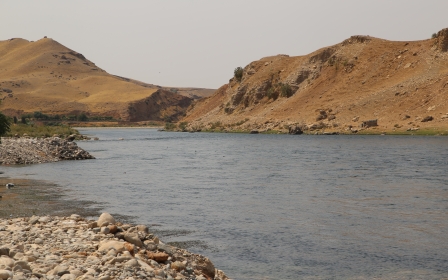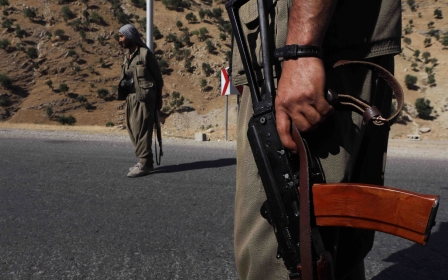'They destroyed our life': Iraqi Kurds fear Turkey's drones in PKK mountain war
Fighting a guerilla movement in the mountains of northern Iraq is not an easy endeavour, even for Nato’s second largest army.
While the usage of sophisticated drone technology has given Turkey an aerial advantage, it has not proven enough to take down the Kurdistan Workers Party (PKK).
But the ongoing military campaign in northern Iraq has succeeded in stoking tensions between different factions in the country's autonomous Kurdish region, as well as having a catastrophic impact on the civilian population.
Middle East Eye was able to speak with inhabitants of the areas where Turkey has deployed and maintains strict surveillance of the countryside with drones.
New MEE newsletter: Jerusalem Dispatch
Sign up to get the latest insights and analysis on Israel-Palestine, alongside Turkey Unpacked and other MEE newsletters
A reign of fear has spread along the Bradost mountains which run alongside the border stretching from the Tigris river to Iran. Local shepherds and travellers have frequently been targeted and directly shot at by Turkish soldiers holding positions in high ground.
“Bradost is under almost complete military control by the Turkish army," said Abdu Rustei, a local reporter who has investigated Turkish operations in the area for years.
"Sometimes, the PKK reclaims areas after clashes, but can’t hold grounds for very long. The Turkish military has a dozen large bases here, alongside smaller outposts."
A state of fear
While direct military confrontation remains limited, drone strikes keep the locals in a state of fear.
Khoshawi Aziz is one of the many victims who was mutilated by an air strike. He recounted the day when Mergarash, his village, was struck by Turkish missiles:
“It was early in the morning when a blast woke us up. We saw our orchards burning and rushed to extinguish the fire. Then, my brother, my cousin and I got hit and my leg was torn apart from my body."
Although Turkey routinely refers to its targets as terrorists, Khoshawi complained that their raids often target civilians.
“There were no PKK militants in our village that day. Guerilla fighters are away in the forest,” he testified.
The same day, all 12 families of the village definitively left their homes.
'The entire village is traumatised, especially the children. One day, we wanted to return to Mergarash to gather belongings, but when we heard drones above our heads, children started yelling, so we returned to Soran'
- Khoshawi Aziz, villager
“The entire village is traumatised, especially the children. One day, we wanted to return to Mergarash to gather belongings, but when we heard drones above our heads, children started yelling, so we returned to Soran.
"Since then, we all skip a beat when we hear a door slam."
Khoshawi, a former member of the Kurdistan Regional Government's peshmerga military force, said he never received any support from the government after his injury or after their exodus from the village.
“The Peshmerga ministry did not pay for any of my surgeries or medication, nor did the federal government,” he complained.
His brother Mahajir still carries shrapnel inside his head and lost hearing in one ear.
"I had to go back to work as soon as I healed to provide for my family," Mahajir explained.
"In Soran, we have more spending and can’t even pay the internet to our children to study at home following house teaching measures imposed to counter the coronavirus pandemic. They don’t get any education right now.”
They said their new house was hastily built with donations from friends and family. Nonetheless, Khoshawi still had to borrow money to complete it.
“Until now, I still owe seven and a half million Iraqi dinars [$6,300]. My creditors are pressuring me to pay back, but I can’t repay them any time soon,” Khoshawi said.
Villages evacuated
According to a statement by the NGO Christian Peacemaker Team (CPT) that conducts ground investigations on the effects of Turkish air strikes in Iraqi Kurdistan, some 97 civilians have been killed and 103 others have been injured because of Turkish bombardments since August 2015.
Furthermore, over 126 villages have been completely evacuated in the region while more than 500 others are under the threat of being completely depopulated.
But these figures do not take into account all casualties. For instance, nomadic groups are also targeted in remote areas away from any inhabited centres.
“On one occasion last July, a nomadic family of twenty was entirely obliterated by a drone strike,” said Hama (not his real name), a local from Sidakan, close to the Iraqi-Turkish border.
As the fighting intensified, the KRG imposed a strict blockade on border areas north of the road between Soran and Zakho which comprise high mountains and deep valleys bordering Turkey.
“We don’t know how you got here in the first place,” commander Ahmed, the head of Zini Warte Peshmerga base, told MEE when asked for an interview.
Zini Warte’s strategic position close to the Qandil mountains where the PKK has its headquarters was the site of a power struggle between KRG forces and the PKK earlier this year which nearly led to an intra-Kurdish conflict.
While not officially supporting Turkey’s operation, the Kurdistan Democratic Party (KDP), the dominant force in the KRG, has regularly assisted Ankara in its operations against the PKK.
The party led by the Barzani family is deeply tied to Turkey since this powerful neighbour provides a vital economic line to the KRG. The KDP has also criminalised all forms of collaboration with the PKK in an attempt to limit the armed movement’s integration in local communities.
Similarly, the KDP has engaged in a crackdown on activists criticising its policy on the matter.
“I’m afraid to come out because the KDP’s [security force] has arrested more than a dozen activists in town following the recent operation in the Gare mountains which opposed pro-KDP peshmergas to PKK militants,” a local civil society figure from Sheladize said under condition of anonymity.
Caught in the middle
Sheladize, in the north of Dohuk province, had already seen an unprecedented assault by unarmed protesters on a Turkish base following the death of four civilians in the vicinity of the town.
While the KDP’s intolerance forced many to remain silent, some are also critical of the PKK’s strategy in the area.
"The PKK levies taxes on farmers and beekeepers in their areas of control. It’s a source of income for them. They call it an environmental tax, but I don’t think it’s fair,” said Mam Suleyman Aziz, the uncle of Khoshawi who has also been displaced from Mergarash.
“I rent a place in Sidakan for a quarter of my pension, but it hasn’t been paid for months due to the KRG’s budget deficit,” the retired peshmerga added.
Recent clashes in the Chamanke region of northern Duhok province reminded many of the deadly Kurdish civil war that set the region ablaze some 25 years ago, leaving thousands dead.
'We are cut off from the rest of the world because of the tensions between the PKK and peshmerga and can’t even buy food or other goods'
“We don’t want another Berakurji,” commander Ahmed said, using a Kurdish word meaning brother killing.
“Personally, if another civil war occurs in Kurdistan, I will not raise my weapon to kill another Kurd."
Apart from assisting Turkey, the KDP also passes on villagers’ requests to visit their farms and harvest a few crops.
“Turkey has a small base in Batifa. It is guarded by Peshmerga fighters," said an inhabitant from Batifa who requested anonymity.
"In it, Turkey gathers and analyses data while evaluating villagers’ requests to farm in their mountain lands. They sometimes allow them, but not for more than a few hours.”
While these little concessions allow some farmers to keep a thin connection with their farms, most areas have been completely depopulated, except for the insurgents still holding ground.
'We don't want war'
Although the KDP sometimes makes official statements criticising Turkish actions, it blames the PKK for the ongoing situation.
“We don’t want war; we had an opportunity to fight, but we decided not to,” stated Aland Amir, the KDP mayor of Chamanke where many peshmerga forces had been recently deployed.
“PKK wants people to evacuate these areas in order to facilitate their movements around,” the mayor claimed.
However, Zagros Hiwa, a spokesperson for the PKK's umbrella organisation the KCK, said their forces had "retaliated to what we consider a move against our forces in the Gare mountain area.
"We are always open to collaboration and dialogues with other factions - the PKK does not want war but will defend its positions in the region,” he stated.
Meanwhile, several villages remain stuck between KRG forces recently deployed (mostly composed of the Roj force, a battalion of Syrian Kurds loyal to the KDP), and the PKK.
“We are cut off from the rest of the world because of the tensions between the PKK and peshmerga, and can’t even buy food or other goods,” a local inhabitant from Bakurman told us in a phone interview.
In the long run, the trauma and violence endured by civilians will continue to burden the population of Iraqi Kurdistan.
“They destroyed my life,” Khoshawi concluded his interview saying, not specifying which party he was referring to.
Middle East Eye delivers independent and unrivalled coverage and analysis of the Middle East, North Africa and beyond. To learn more about republishing this content and the associated fees, please fill out this form. More about MEE can be found here.





